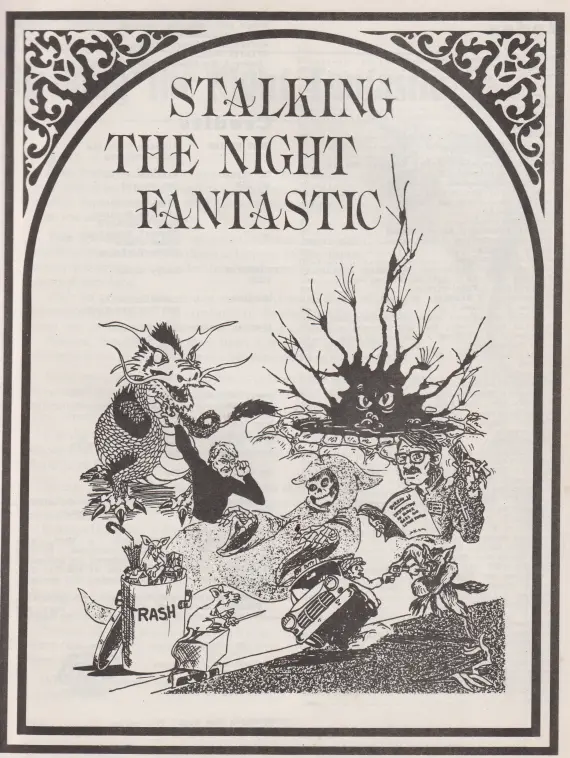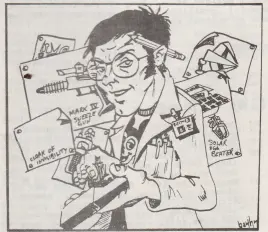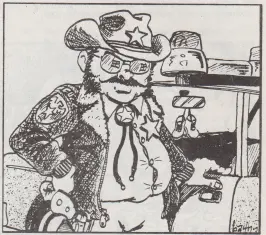When you're in the hobby of roleplaying games, you tend to eventually amass a collection of curiosity games. Sometimes these are big, persistent game franchises, and other times they're momentary publications from a smalltime press that never saw wide distribution and probably faded from memory. Today, many of these come from drivethrurpg.com, but before that they often came in the form of a photocopied, sometimes spiral-bound, book of somebody's typewritten manuscript. One such game is Stalking the Night Fantastic, an RPG set in modern day (meaning the 1980s, at the time of publication) USA. I don't remember how I came to own a copy, but it's on my shelf, and I've played it both as GM and player.
If you're reading this post in January of 2023, then it may seem like this post is one of those recommendations of other systems, in the event that you're migrating away from Wizards of the Coast's D&D. While I do encourage migrating away from Wizards of the Coast, because they've made it abundantly clear (for the second time) that they cannot be trusted with a fantasy roleplaying game, this post was written months ago. This game isn't an alternative to fantasy roleplaying games, or even a game I think you should play. It's a look back at an old game, with no sub-text intended.
The game
Published in 1984 by Tri-Tac Games as an orange spiral-bound book. This is the inside art:

And here's the sales pitch on the back of the book:
The history of the human race is filled with evidence of eerie and unexplained occurrences. Our myths,legends and fairy tales consistently reaffirm that the supernatural exists.
The public has come to believe that magic and the supernatural are the stuff of childrens' dreams and nightmares. They are wrong.
In the early 1860's, the United States established a secret supernatural investigative agency under the cover of the Civil War. Only a few top officials knew of its existence. It became known simply as Bureau 13.
In the year 1983, Bureau 13 is an ultramodern force, more secretive than ever before. It fights to stem the growth of ancient magic and the supernatural that threatens the innocent. Wherever the supernatural awaits, the agents of Bureau 13 will be there, but...
Evil is growing.
The system
So you're with Bureau 13, a secretive government agency dedicated to solving paranormal crimes. You have access to the latest tech to help you with the job. Depending on how you rolled while creating a character, you may even have access to psionics (powers of the mind) or magic (powers of the universe).
When I played it, it did result in some fun games, but to be honest this was in spite of the system's mechanics. Most rolls that matter are performed with a d100, which seems really intuitive in theory. What's simpler than straight percentages? We talk in percents all the time, so rolling a d100 and getting a result of 75% or 37% or 2% is pretty easy to understand. How likely is it that you sneak past that ghostly figure standing under the streetlight? Roll the die.
The problem, in practise, is that a d100 has a lot of numbers. 100 of them, to be exact. That's a lot of opportunity to fail at a task, regardless of how good your character sheet says you at the related skill.
Success in Stalking the Night Fantastic is achieved by rolling under a skill threshold. The threshold is a difficulty score determined by the GM, plus your skill, plus any relevant modifiers. So if the GM sets a difficulty of 5%, and you have 8 in Espionage, and you argue that your 12 Dexterity should also contribute to your success, then you must roll under 25 (5+8+12) on a d100. That means you can roll success in 24 possible scenarios of your roll, but failure in 76 possible scenarios.
The same mechanic on a single d10 means you must roll a 1 or a 2 for success. That's two possible scenarios for success and just 8 for failure. The percentage is basically the same, but the experience of rolling is different. And in Stalking the Night Fantastic, you profoundly feel that difference.

Another "problem" is the number of skills. It's not really a problem, but it's a learning curve that feels like a problem until everyone playing the game has memorised the skill list. In a "simple" game like D&D, you have 6 attributes and maybe a dozen skills. A Dungeon Master quickly learns the skills and can ask players for specific skill checks as needed. In skill-based systems like Stalking or even Shadowrun, there are too many skills for most people to easily memorise. In practise, that means the player proposes a skill to use in the face of a challenge.
This is arguably a better gaming experience than having the GM dictate to players, essentially, the obvious solution. When the GM tells a player there's a locked door, and then asks for a Strength check to break it down, the path to success looks exactly one way. A player might not think to try to pick the lock, or to check for another way around that door, because the GM has already dictated the solution. It's a lot better for the players and the GM and the game itself when the players are simply told that there's a locked door, and it's up to them to propose skills they might roll to get around it. It might seem silly in the moment, but when a player suggests that they use their Negotiation to convince the door to open, who knows what'll happen. Will that give the GM some new ideas about the story? Is the door suddenly sentient? Is there now a loudspeaker over the door, through which you can talk to a gatekeeper? Maybe there's a creature just on the other side of the door who hears the players talk, and thinks that they're addressing it. Who knows.
But that is a learning curve for players. They have to look at the skills they have, they have to learn to apply them to fictional situations. For longtime TTRPG players, that might come as second nature, but for new players it can be difficult.
Character build
- Choose a name.
- Choose your ethnicity.
- Choose your occupation before joining the Bureau.
- Choose your age.
- Choose your gender.
Enter these values on your character sheet in a section labeled Identification.
Statistics
Do this ten times, once for each statistic type:
- Roll 4d6 and subtract 4
- Strength
- Constitution
- Dexterity
- Agility
- Intelligence
- Wisdom
- Luck
- Charisma
- Accuracy
- Sensitivity
Enter these values on your character sheet in a section labeled Statistics.
Calculations
Some statistics are not the results of a roll, and instead are calculated from other values:
- Throw = (Strength + Accuracy + Dexterity) / 3
- Dodge = (Strength + Agility) / 2
- Hit points = Strength + (2 x Constitution) + 1d10
Enter these values in the Statistics section of your character sheet.
Percentages
Roll 1d6 to determine your Magic Resistance percentage.
Enter these values on your character sheet in a section labeled Skills, but place an asterisk by Magic Resistance because it is a unique skill.
Psionics
Roll 2d20 and subtract 20. A positive result is your Psi potential.
Roll 1d100. A result equal to or greater than your Psi potential is your Psionics score.
If you rolled less than your Psi potential, roll one more time. If you roll under your potential this time, then you have Psionics, but roll 1d6 for a side-effect:
- Tingling
- Nausea
- Headache
- Migraine headache
- Nosebleed
- Shakes
Calculate your Working Psi (WKP) score: Constitution + Psionics
Enter these values on your character sheet in a section labeled Resources.
Calculate your Mental Coordination (MCD) score: (Intelligence + Agility) / 2
Enter your WKP in a section of your character sheet labeled Supernatural.
Piety
You may use Piety once every 12 hours to add 1d4 bonus to any roll. To use Piety, you must roll under your Piety score on 1d20. If a character with a high Piety score fail to act with sufficient piety, it may cause the GM to lower your level.
In order to use Magic, you must have a Piety score of 10 or higher, and a Psionics score. Choose your piety level now, from 1 to 20.
Magic
If you have a positive Psionics score, you may now choose whether you want to use Psionics (powers of the mind) or Magic (powers of the universe).
This choice is permanent.
- If you choose Magic, change the label of your Psionics score to Magic.
- Choose your type of magic: white, gray, or black.
Skills
You start with a number of skill points based on your Intelligence:
- 1-4 = 6 skill points
- 5-9 = 12 skill points
- 10-16 = 15 skill points
- 17-19 = 19 skill points
- 20-21 = 22 skill points
- 22-24 = 26 skill points
Choose a skill realm:
- W: Work experience
- T: Technical school
- M: Military education
- H: Higher education
- S: Self-taught
Now choose your skills:
- Choose 1 primary skill from your chosen realm. The value for this skill is 1d4 + 4. This is a free skill and does not count against your total number of skills.
- Choose 2 secondary skills from your chosen realm, which are related to your primary skill. The value for these skills are 1d4 + 2. This is a free skill and does not count against your total number of skills.
- Choose a number of skills from your realm according to your Intelligence. The value for these skills is 1d4. You may choose a self-taught (S) skill, but at the cost of 2 skill points.
- Choose one bonus:
- Hobby: +1 to any two skills related to your character's hobby.
- Consistent: +1 to any one skill that your character uses consistently.
- Creative: Add +2 to any one creative or artistic skill (art, writing, music, and so on).
Enter your skills on your character sheet in a section labeled Skills.
Skill list
--HMSAbnormal psychologyW-HMSAccountingWTHMSAdministration-T-MSAir sea navigation-THMSAerodynamics-THMSAeronauticsWTHMSAgriculture--H-SArchaeologyWTHMSAnimal husbandryW-HMSAnimal training--HMSAnthropology-T-M-Aquatics vehicles technology-T-MSAquatics (Diving)--HMSArchery technology--HMSArchery (not a percent; gain +1 to archery for every 3 Archery points)-THMSArt, commercialWTHMSArt, drafting-TH-SArt, painting-TH-SArt, sculpture--H-SArt, history-THMSAstronomy--HM-Astrophysics-THMSAtmospherics (Weather)W-H--Banking--HMSBalloon technologyWT-MSBarbering-THM-Biochemistry--H-SBiology, Animal--HMSBiology, Human--HMSBiology, Marine---MSBlade fightingW-HMSBlade weapons technologyW-HMSBoating, smallWTHMSBoating, largeWTHM-Boating, large commercialWTHMSBoating, sailW-H-SBrokering, commercial--HM-Business lawWTHMSCalligraphyWTHMSCeramics, classicalWTHMSCeramics, industrialWTHMSChemistry, general-THM-Chemistry, organic-THM-Chemistry, inorganicW-HMSChild care-THMSCivil engineering--HMSCivil law---MSCold survival---MSCommando training (+5% survival per point, and gain +1 to combat per 5 points)WTHMSCommunications technologyWTHMSComputer programmingWTHMSComputer operationW-H--Corporate managementWTHM-Corporate structureWTH-SCosmetologyW-HMSCriminal investigationW-HMSCriminal lawWTHMSCriminal science---M-Cryptology---MSCrude weaponsWTH-SCuisineW-H-SDancingWTHMSData manipulationWH-MSDemolition---MSDesert survival--HMSDiplomacyW-H-SDomestic technologyWTH-SDomestic tradeW-H-SDrama, theater artsW-H-SEcology--HM-EducationWTHMSElectronic diagnosisWTHMSElectronic engineeringWTHMSElectronics, microWTHMSEmergency medical careW-H-SEntertainerWTHMSEnvironmental engineeringWTHMSFabrication, metalWTHMSFabrication, woodWTHMSFabrication, plasticW-H-SFashion--HMSFencing (not a percent; gain +1 to foil and sabre for every 3 points)---M-Fighter pilotWTHMSFinanceWTHMSFood processing-THM-Fusion technologyWTHMSFluid systems--HMSForest survival--HMSGeography-THMSGeology---MSGrenade weapons---MSGuerrilla tacticsW-HMSGymnastics--HMSGlider technologyWTHMSHealth careWT-MSHeavy equipment operation--HMSHistoryW-HMSHorsemanship-TH-SInterior design---MSInterrogationWTHMSJournalism---MSJungle survivalW-HMSLabour relationsWTHMSLanguage (additional)WTHMSLaser technology--HM-Law enforcement--HM-LinguisticsWTHMSLifesaving (drowning)WTH-SMarketing--HMSMartial arts-THMSMathematics--HM-Mathematics, higherWTHMSMechanical diagnosis-THM-Metallurgy-THM-Microwave technology--HMSMountain climbingWTHMSMortuary scienceWTH-SMusic technology--H-SMusic performance-THM-Nuclear physics--HM-Nuclear weapons technologyWTHM-Nursing (+5% to medical assistance per 5 points)-THMSOceanography-THMSOptics--H-SPhilosophyWTHMSPhotography---MSPhysical surveillance--HMSPhysics--HMSPolitical scienceWTHMSProjectile weapons technology (see rules, page 12)--HMSPublic speaking--HMSPsychologyWTHMSPilot, motor vehicle (see rules, page 12)WT-MSPilot, heavy motor vehicle--HMSPilot, ultralight aircraft-THM-Pilot, fixed wing (prop)-THM-Pilot, jet-THM-Pilot, rotary wingW-H-SReligionWTHMSRetail science-THMSRoboticsWTHMSSanitation engineeringWTHMSSecurityWTHMSSkiing--HMSSociologyWTHMSSolar electric technologyW-HMSSwimming-THM-Structural engineering-THM-Tax lawyer (see rules, page 13)---MSTactics-THM-Undersea engineering--HM-Undersea survivalWTHMSUltra light aircraft technologyWTHMSVehicle repair, auto---MSWeapons, military light---M-Weapons, military heavy
Extra-legal skills
----SExtortion----SEspionage----SAssault----SPick-pocketing----STax evasion----SSafe cracking----SKidnapping----SPetty theft----SBreaking and entering----SElectronic counter measures----SIllegal gaming----SAssassination----SComputer crime----SOrganized crime----SBooking (bets)----SDrug trafficking----SCounterfeiting----SGrand theft----SFraud----SForgery----SSmuggling----STerrorism----SProcuring----SArson----STraps----SBrawling
Bureau 13 Skills
When indoctrinated into Bureau 13, your character received 1d4 + 2 specialised skills. The value for each of these skill is 1d4.
- Magic, white or grey
- Magic, black
- Supernatural (spirits and undead)
- Supernatural (natural)
- Paranormal psychology
- Criminal psychology
- Wiretapping
- Document forgery
- Psionic study
- Heavy weapons
- Demolition
- Computer tapping
- Evidence dispersal
- Combat driving
Game master
Instructions for running the game.
For checks based on just a stat, a player must roll under that statistic on 1d20 for success. Skill checks, though, are more complex.
Skill checks
- For a standard skill check, the GM sets a difficulty number (DIFFICULTY RATING, page 15). This provides the base percent of success.
- The player adds skill percents and any relevant modifiers. The total (5% + SKILL + MODIFIERS) provides the target number.
- Player must roll UNDER the target on a d100 for success. A 01 is always a critical success, while a 00 is always a critical failure.
Magic resistance is a unique case.
- Roll under MAGIC RESISTANCE on a d100 to resist magic. You may allow the player to add PIETY for a single action.
Magic
- Roll under WKP for psionics and magic for successful casting.
The story
Stalking the Night Fantastic benefits from its setting. It's a familiar setting (the modern world), but with paranormal dangers lurking around every corner. For me, it's always been set in the suburbs of the US, because that's where I grew up. The suburbs were (and are) exactly as advertised: mundane, boring, repetitious, and seemingly endless. Adding in some supernatural dangers to make the walk home from school or church or karate practise was very appealing.

So the game is actually pretty fun, but not because it's an amazing system. It's fun because it's a system, and it is usually fun to unravel the rules and mechanics of a new game. I don't recommend hunting down a copy of Stalking the Night Fantastic, especially because there are better systems that can provide a similar experience. I do heartily recommend trying a new game system, though, even if it's just for an evening. A fresh look at how you roleplay is worth the diversion.
All art contained in this review blog post is scanned from my original copy of **Stalking the Night Fantastic**, used according to the copyright statement on the inside cover: "No part of this book may be reproduced by any means whatsoever without permission of Tri Tac Inc. except in case of brief articles and reviews."